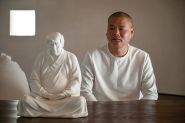
On the occasion of her 40 years of career, Angélique Kidjo continues to electrify stages around the world by honoring her African roots, which she considers the cradle of all music. With prestigious collaborations and humanitarian commitments, the Beninese, French and American singer, a five-time Grammy Award winner, refuses to be confined to the label of "World Music" and remains a committed voice for freedom and women's rights.
All music “has its roots” in Africa, says Angélique Kidjo. “In this world, you have a place everywhere.” Driven by this family mantra, star singer Angélique Kidjo celebrates 40 years of a career during which she has transcended trends while celebrating African heritage, the "cradle" of all music.
Whether revisiting Ravel’s Bolero, Celia Cruz’s salsa or David Bowie, through piano-voice renditions or with a symphony orchestra, the singer, who holds three nationalities (Beninese, French and American) and five Grammy Awards, has never lost sight of the continent that saw her birth in Cotonou.
“There is no music that does not have its roots in Africa,” the 64-year-old artist tells AFP. Her “40-year tour,” launched a year ago in London, makes a stop in Paris this Monday at the Sainte-Chapelle, before concluding in early November at New York’s Carnegie Hall.
But slowing down is not an option. Always between two flights, Kidjo is working on numerous projects and has just finished the video for her duet with Davido, the heavyweight of afrobeats, after celebrating the 100th birthday of former US President Jimmy Carter.
“What gets me up every day is the search for what can unite us,” explains the polyglot singer, capable of sharing the stage with veteran Carlos Santana or Nigerian sensation Burna Boy.
However, do not mention “World Music” to her, the label under which she broke through in Europe, spotted by Chris Blackwell, the legendary producer of Bob Marley.
“I’ve always hated that term. For me, it’s a ghetto. It’s when you’re not singing in French or English, the languages of colonization.”
Singing Before Speaking
Where does her energy come from? Before becoming a great African voice, alongside her idol Miriam Makeba, Angélique Kidjo was an asthmatic child, raised in Cotonou in a large family that was poor, yet open to the world.
“I started singing before I could speak,” she recalls, to the point of worrying her parents. “They were afraid I wouldn’t talk. But when I started, they regretted it,” she laughs.
Born on French National Day in 1960, 15 days before Benin’s independence, little Angélique was fascinated by the vinyl records her parents owned, while also questioning things.
“On 98% of the covers, there were only men, and I started asking: ‘where are the women?’” she recalls, mentioning the shock she felt when she discovered Aretha Franklin, the first Black woman she saw on an album.
As a teenager, Kidjo wrote her first songs and made a name for herself in Benin. But the pressure of the Marxist dictatorship, which demanded that artists follow orders, forced her into exile in France in 1983.
Forty years later, the memory remains vivid. “When you’ve lived through that and you know how fragile our freedom is, you cannot stay silent,” she notes.
She has never stayed silent, neither on stage nor at major events like the G7 or the Davos Forum, where she tries to awaken consciences. “Leaders are full of good intentions, but they don’t have the right information,” sighs the artist, who performed for Barack Obama in 2009 and in 2018 in Paris, for the centenary of the Armistice, in the presence of Donald Trump.
“At Davos, I started thinking, ‘There’s something missing: where are the people?’ (…) If it’s just a club where people sit and congratulate each other, things won’t move forward,” says this UNICEF ambassador and founder of Batonga, an organization supporting the education of African girls since 2006.
The fate of women is at the heart of her commitment. “What twists my guts is seeing how we harm our children,” says the singer, who has yet to find the answer to the riddle of sexism. “The question I want answered is: ‘What threat does a woman represent to a man?’”
With AFP



Comments